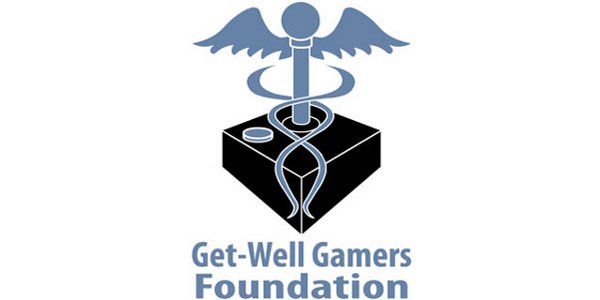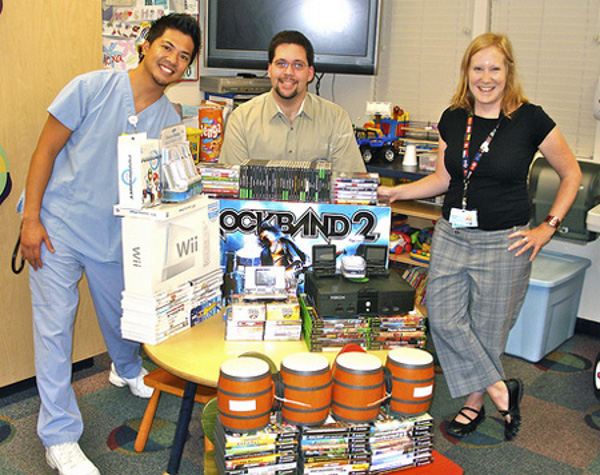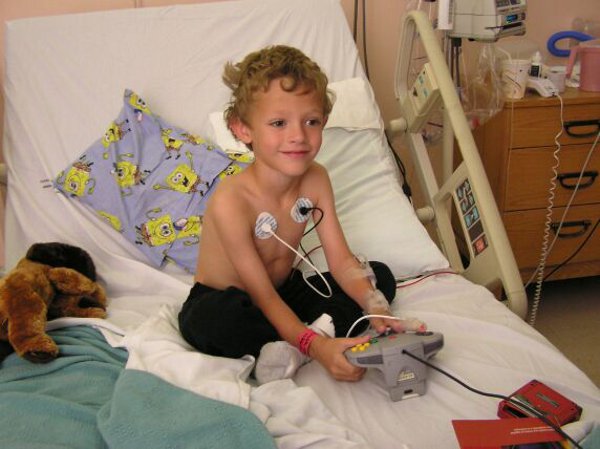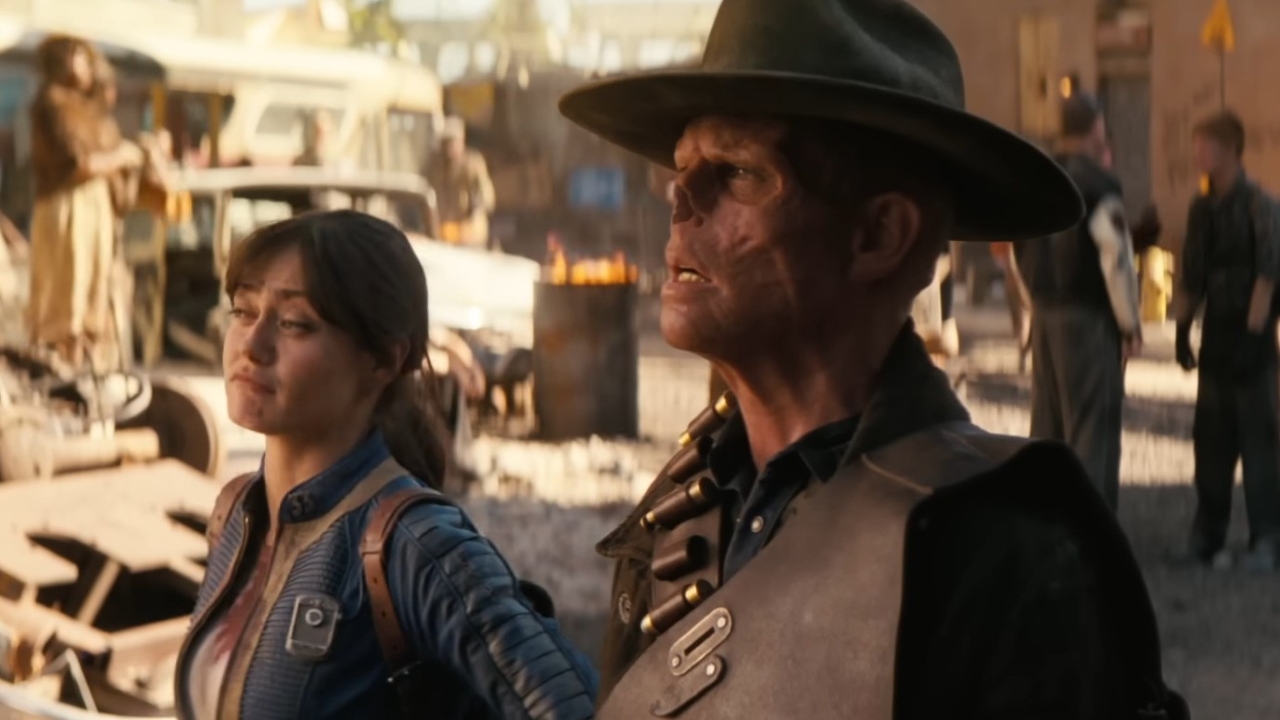Get-Well Gamers Interview: Bringing Video Games To Hospitalized Kids

Katy Goodman chats with Ryan Sharpe, founder of the Get-Well Gamers Foundation about Get-Well Gamers Foundation and exposes one of the many positive sides to video games.
Often bearing a heavy blame for violence and indolence, video games always seem to carry with them a negative connotation whenever mentioned in media. Funny, because there is little to no tangible evidence that violent video games incite violent actions; I personally grew up playing games like Doom and Call of Duty, and I can’t even find it in my heart to kill most insects.
It was in these baseless accusations of video games that I found inspiration to pursue research in benefits of video games for my Master’s degree. There are multiple studies proving that playing games can actually improve both speed and accuracy with critical thinking, leading into studies on how games can actually alleviate or delay the effects of diseases like Alzheimer’s. There is also evidence that supports the educational value of games in active learning. The best part is that all of these studies are backed by numbers and actual facts, something our media tends to forget. Essentially, it seems like there are far more benefits to video games than there are negative side effects.
Continuing my quest to prove to the world that video games are awesome, I searched the floor of this year’s E3 for a few organizations that do just that on a daily basis. Amidst the frenzied atmosphere of this year’s E3, I was lucky enough to meet Ryan Sharpe, the founder of the Get-Well Gamers Foundation. Get-Well Gamers, founded in 2001, is a non-profit organization that supplies video games to pediatric sections in hospitals. Initially sending donations to a couple of local hospitals, the foundation now touches the lives of around 1.15 million kids a year. Following this year’s E3, I had the pleasure of chatting with Ryan about the foundation, how video games affect children, and how the future of the industry will affect the the foundation as a whole.
Can you tell us a little about the Get-Well Gamers Foundation and when you started it?
The Get Well Gamers Foundation was started in 2001 and it was dedicated to finding a way to bring video games and electronic entertainment to hospitalized children, first in the United States and now actually around the world.
And how many hospitals did you initially start with?
Your Daily Blend of Entertainment News
We started with two hospitals. Seattle Children's, which was near where I was going to school, and the Children's Hospital of Orange County, which was by my old hometown. Now we are up to over 180 hospitals in the US, Canada, Iceland, and England.
Wow, that's incredible. So what inspired you to start the foundation?
Well, I was sick myself as a kid. There was such an amazing difference between the time spent when I didn't have video games available at my hospital and the time I spent when I did. Because, you know, this was back in the day before there was cartoon network or anything, and after maybe 10 o’clock at most, any kind of child entertainment was gone. It was all game shows and soap operas and boring stuff like that.
And that was back when TV had like, 12 channels, so you can imagine between that 10 o'clock at the period after school when I was just bored out of my mind. When you are already in a hospital you have something weighing on you... just being sick, what hurts, what is difficult, and all of that other stuff. They finally added video games to my children's hospital, which was just a pair of arcade machines in the employee break room. That was it. It was Zaxxon and Donkey Kong Jr.
No way! Oh those games...
Even still, just being able to wheel my IV stand down the to the break room and drape the drip over the second player controller and lose all of those boring hours and not even remember that you are sick. You know, you are just able to lose yourself in those games and enter a world outside of the hospital walls.
That had such an impact on me that when I was in college I got together with some friends and one of them said that he had recently been sick. He had gotten the flu and spent a week just playing video games, and that is how he got over it—video games, water, and rest. One of my other friends recalled a time when he was in the hospital and said, 'Boy, I wish I also had video games when I was in there!' So it just kind of hit us—somebody should do that. Somebody should be getting video games into hospitals, and every hospital should try to have them. There was really no one else out there at the time that did that, so we just started doing it ourselves.
That's so great. So how many people are working with the program now, are your friends from college still involved?
It is a lot of the same group, including volunteers. When we get volunteers and stuff... when we have events like the Electronic Entertainment Expo and the Game Developer's Conference, we get a lot of volunteers and can have 10 to 15 people working at the same time. But for most of the day to day stuff it is a core group of three to four people.

That's such a big endeavor to take on with that amount of people. What are some of the biggest challenges you guys face in terms of networking, especially with different hospitals?
A lot of it is just going through the Post Office. The real difficulty in getting new hospitals really has to do with finding the right person to talk to. In the early days we would try to talk to hospital administrators who, forgive me for saying, just didn't really get it. You know, 'I don't know about this video game stuff.' But we just started calling around and discovered that there is this position called the Child Life Director, which is basically the person responsible for all of the child's non-medical care during their stay. Not just medicine and x-rays and things like that, but actually keeping them well and happy. Those people are the ones who have actually been in the trenches and they know what makes the children happy. Most of them have said that it [video games] is one of the best things they have.
We send an annual survey to our hospitals every year and ask if they enjoy having video games for long term stays. The answers are between always, usually, sometimes, rarely, never... it was 58% always and 42% usually. I’ve never even seen anyone put sometimes.
And that was this year's survey?
Yeah, that was this year's survey.
That's fantastic. Video Games are obviously a very different form of entertainment from the TVs and magazines they often have in the hospitals—primarily because they are so interactive and immersive. Is that why you think they are so effective for children in hospitals?
Yeah, definitely. They have actually done a study that proves that fact. Looking at brain activity, games require more attention than books or movies or even board games, because video games engage you visually, auditorily , tacitly, and most importantly cognitively... you know, you really have to think about what is on the screen at all times. Games use so much of your brain’s bandwidth. These studies have shown that your brain actually starts to deprioritize the pain centers of your brain. Instead of an obvious pain message, the pain becomes a low hum. Your brain is going, 'I get the idea, but I don't need to know every time. I'm busy.' You know, it literally on a physiological level makes people forget they hurt when they are playing a video game.
And that's such an incredible thing, especially for children in hospitals. I remember in a previous interview I heard you talking about a study about on Game Boys and how they are more effective for children who are going into surgery than...
Than tranquilizers, yes.
Can you expand on that a little bit?
It's something they are a willing participant in and there is a calming effect to it. It's important—when you are putting someone under general anesthesia you are nearly killing them and you don't have a lot of room for error between being too much and being too little, which means either death or waking up during surgery, both horrific circumstances.
So the fact that a Game Boy can engage them so much and set them in this zone of a calm steady heartbeat and rhythm. Tetris is more effective than a tranquilizer in keeping children steady and stable prior to surgery.
And probably less expensive. [Both laugh]
Yeah, that's one of the things that is so great. With medical supply places, the kinds of things they use for therapy and other medical needs can cost hundreds to thousands of dollars. But these physical therapists can get as much mileage out of a Rock Band set as something that costs 10 times as much for basically the exact same thing; these are just retail off-the-shelf solutions which are great and effective.
On a sadder note, the amount of money that is allotted for these things, for children just to be able to enjoy their stay with things like non-medical wellness, averages out to less than a dollar per patient per year; it's actually more like 71 cents for the whole year. Many of our hospitals have told us that if we didn't send them games, they would have none. There is just no budget for it. Like you said, video games are engaging on so many different levels. They are also rather immersive in social aspects as well. Do you ever see kids playing with other children in the hospitals or with their siblings and friends over things like Xbox Live or PSN?
There is [a social aspect] but only a small percentage of our hospitals are internet capable. But, what you do see a lot of is that they are used greatly as socialization tools in places with large migrant populations. Like in San Francisco, there is still a large population that only speaks Chinese, but what you will see is that, if you put two children in front of a soccer or football game, or any kind of sports game, it doesn't matter that they don't know the words. They just know it is the basic play of ‘I can get there before you can or I have a higher score.’ They don't need to understand each other; they can still socialize, play with each other, and like each other even though they don't know what the other person may be saying.
Like in New Mexico with the Spanish population or in some parts of Wisconsin or Illinois with the German and Polish populations. Even if these kids can't talk they can still play—and that is something that video games create a unique bridge to.
I totally agree. At E3 this year that is one thing I really noticed—just how massive the industry is. I met people from all over the world. It's amazing how a single passion can bring so many people together. That's also a huge thing for children stuck in hospitals, especially because social interaction is important in so many aspects, medically and psychologically. The online connectivity issue you mentioned brings up another question... obviously this was a big year for video games with the announcement of the next generation of consoles. How do you think this next generation will affect the way the foundation is fun in the future?
Well there was quite a bit of concern early on with the Xbox One announcement.
With the DRM and Online Connectivity issues?
Yeah. Like I said, only a small percentage of our hospitals have patient accessible internet. So if you needed to check online every 24 hours to make sure that you actually owned your game—well, that would completely ruin our ability to use that system for hospitals because they wouldn't be able to fulfill that.
Now, from what I understand, that is basically cured. I'm sure that for the one time online connectivity at the beginning, a person in the hospital's IT department could get it fixed. I am, however, disappointed with both Sony and Microsoft not having any backwards compatibility going forward. That is usually a huge thing for us because not only does it make it more convenient for the hospitals—like how the launch editions of the PS3s could play the role of three different systems (PS1, PS2, and PS3). Also donation-wise, when a system has good backwards compatibility we will get a lot of their previous systems. Like when the PS2 came out, we got a lot of PS1s because, well, what did the donators need it for? They could play all of their games on the PS2, so it became spare hardware that could be used for a good cause. The same thing happened when the PS3 launched.
Now, especially with the likes of PSN or Xbox Live Arcade, a lot of those games are tied to the system and you can't take them with you in any way. I don't expect an increase in Xbox 360 or PS3 donations once the PS4 and Xbox One launch.
Unfortunately I think a lot of charities are being affected by the new policies. However, I do think some companies are starting to realize the problems with strict DRM policies and online connectivity, though many believe that to be the future of gaming. Regardless, with the online market there is still the lack of ability to give away older games.
Exactly. They say that you can make money on the games you buy in this way or that way. It doesn't occur to them in a business sense—what if you want to be able to give it away? I know we are not a market or demographic, but it is just one of those things where there is nothing I can do for people who want to give away their games, and that is what we survive on. If these policies continue and the previous generations’ vanish I don't know if we will be able to continue. It isn't what the hospitals are equipped for; it's not what we can do. The logistics with digital rights transfer and stuff like that... I mean I hate to poke fun, but that Sony “How to Share your PS4 Games” video—that is what we need. That is what is required to keep the foundation going. For someone to just give a game to somebody else.

So obviously developer policies affect the direction and future of the foundation. With that being said, do you ever get donations from big developers or do you mostly rely on individual gamers?
I would say about 80% of the foundation's inventory is from private and personal donations from regular every day gamers. We do have a few partnered donors, but at times they are not reliable. You know, one year we will get a donation from company A and the next year from company B… then maybe two years down the line maybe company A again, but it isn't a consistent thing. The one exception to this would be Ubisoft. Shout out to my friends there, Victor Fajardo and Scott Fry, because with their latest donation Ubisoft has actually passed the quarter-million mark with software that they sent to us over the years.
That is awesome!
Literally, they have sent thousands of games over the years and this is only, I believe, their fourth donation. They have been the only ones who are consistent with it, so big props to them. We are never short of Wii games because of them.
So is the foundation looking mostly for specific consoles or games in terms of donations, or do you take anything?
The answer is yes. [laughter]
All of the things.
Yes. Do you guys want? Yes. Is it a video game? Yes. Okay, there we go.
Because the foundation is based in pediatric wards, do you only take games that have specific ratings? What happens when someone wants to donate a Mature-rated game?
We do get Mature-rated games. There are facilities that are longer term "homes" for people. If you come to know a certain staff, it's not like they kick you out on your 18th birthday. Some of our "pediatric" wards serve patients as old as 23, so if they want to play Gears of War let them. And we do work closely with other charities—there is actually one similar to Operation Supply Drop called Fun for our Troops and we have a trade going with them where they send us all of the stuff that is too kiddie for soldiers and we send them things that are too violent for children. Not all of it, obviously, but some of the stuff we don't use.
So regardless, whatever you get goes to a good cause.
Right. So the point is, whatever we get in, if we can't put it in the hospital directly, we will perform a sort of cooperative alchemy and turn lead to gold, so to speak. We find a way to turn those games we can't use into ones that we can.
Do you do a lot of direct work with the children at your hospitals?
I would really like to, but unfortunately we don't. The thing is, it just comes down to logistics. If I wanted to go down to one of our hospitals in Texas or Kansas and actually give a donation in person—meet with the kids, take pictures, and things like that, which would be great and helpful, but the cost of that and hotel fares and everything else, it is just too much. To do something like that for one hospital when we can ship donations to every hospital in our network, it doesn’t make sense. If there is something going on there, like a local newspaper or television show, then having press events to help us get donations and funding makes it worth it, but financially we can't just go out and do that, as much as we would like to. As nice as it would be, it's not a moral use for that money to focus on one hospital when that same money can be used to help a hundred hospitals.
Do you often receive feedback or stories from children or hospitals that receive donations? Do any of the stories stick out to you?
Oh yeah, we get tons of letters and stuff from hospitals. I love the crayon drawings—they are always touching. One of my favorite stories actually comes from one of our first hospitals, the Shriners Hospital in Los Angeles. It is an orthopedic hospital, so they deal with a lot of traumatic injuries from car crashes and house fires, stuff like that. There are quite a few amputees there, sadly.
One of the first stories I heard was from a boy and a girl. The girl had lost her left arm at the wrist and the boy lost his right arm at the elbow. So the boy would stand there with a Guitar Hero guitar over his neck and he would fret cords while the girl would stand next to him over his shoulders and strum; they would play like that for hours. They were actually able to five-star songs on hard, which is something I can't even do. They didn't even know each other, they weren't even related. They knew each other from the hospital and they both liked the game, so they found a way to play it together. That is co-op hardcore.
Yeah, that definitely is! And again, it goes to show how video games can bring people together through hardships like that. Lastly, to wrap things up, how can our readers and viewers get involved with Get-Well Gamers?
Well as always there is our website at www.getwellgamers.org and we are always looking for new donations obviously, and for funding.
We are also looking for new hospitals to send our donations to, so if there is a hospital in your area that you think could use the foundations services, please just let us know about it. This isn't a super sophisticated operation. Most of our hospitals come from putting the name of a state and children's hospital into Google. So if you know someone who has been to a certain hospital or if you have been to one yourself, please let us know, because we are always looking for new hospitals.
The foundations mission, in the long term, is to be the red cross of gamers. Anywhere there is a child who is sick or injured, if they want a videogame to help them make their recovery time not so dreary and painful, we want a foundation video game to be there for them.
Get-Well Gamers is looking for new donations and hospitals to reach out to even more children, so be sure to spread the word. You can donate or recommend new hospitals at GetWellGamers.org.
